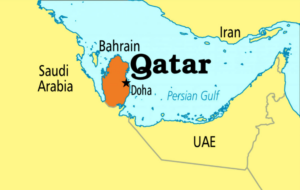India-Qatar Relations: The Imperative of Rescuing Indian Nationals Facing Death Penalty
Context:
The recent decision by a Qatari court to impose the death penalty on eight Indian nationals, accusing them of espionage, has stirred widespread concern in the Nation.
Background:
- The trial was highly secretive, offering little information about the charges and the evidence against the former Indian Navy personnel, arrested in August 2022. Despite pleas from their families and Indian diplomats, Qatar has been reticent in sharing details of the case, and the judgment itself hasn’t been communicated to New Delhi.
- Leaked reports have hinted that the men were accused of sharing classified information related to the stealth submarine program they were involved with, allegedly to a third country—a claim vehemently refuted by their families.
Relevance:
GS-02 (Government policies and interventions, India and its neighbourhood)
Prelims:
- India Qatar Relations
- Naval Exercises
- Exports and Imports related to Qatar
- Land boundary and adjoining areas of Qatar
Dimensions of the Article:
- Diplomatic Dilemma and Lack of Transparency
- Geopolitical Ramifications
Diplomatic Dilemma and Lack of Transparency
- The opaque nature of the trial and the absence of substantial details pose a significant obstacle for India to navigate this sensitive situation effectively.
- Clarity and openness from Qatar regarding the charges against the accused individuals are imperative.
Geopolitical Ramifications
- While speculations suggest that the motives behind the verdict might be linked to the perceived differences between Qatar and India over their stance on the Israel-Palestine issue.
- However, India’s focus should be on ensuring the safety and justice for its citizens.
- Negotiating this complex diplomatic scenario demands careful handling to safeguard India’s foreign policy interests and the rights of its citizens.
- India must navigate this situation while considering the mutual benefits and the significance of maintaining robust and amicable ties with Qatar.
Conclusion:
The Indian government must act promptly and employ a well-thought-out strategy to extend the best possible support to the accused individuals during the appeals process. Immediate steps should involve leveraging high-level diplomatic channels, potentially involving the Prime Minister, to advocate for clemency and a potential commutation of the sentence, possibly allowing the serving of the term in India.




